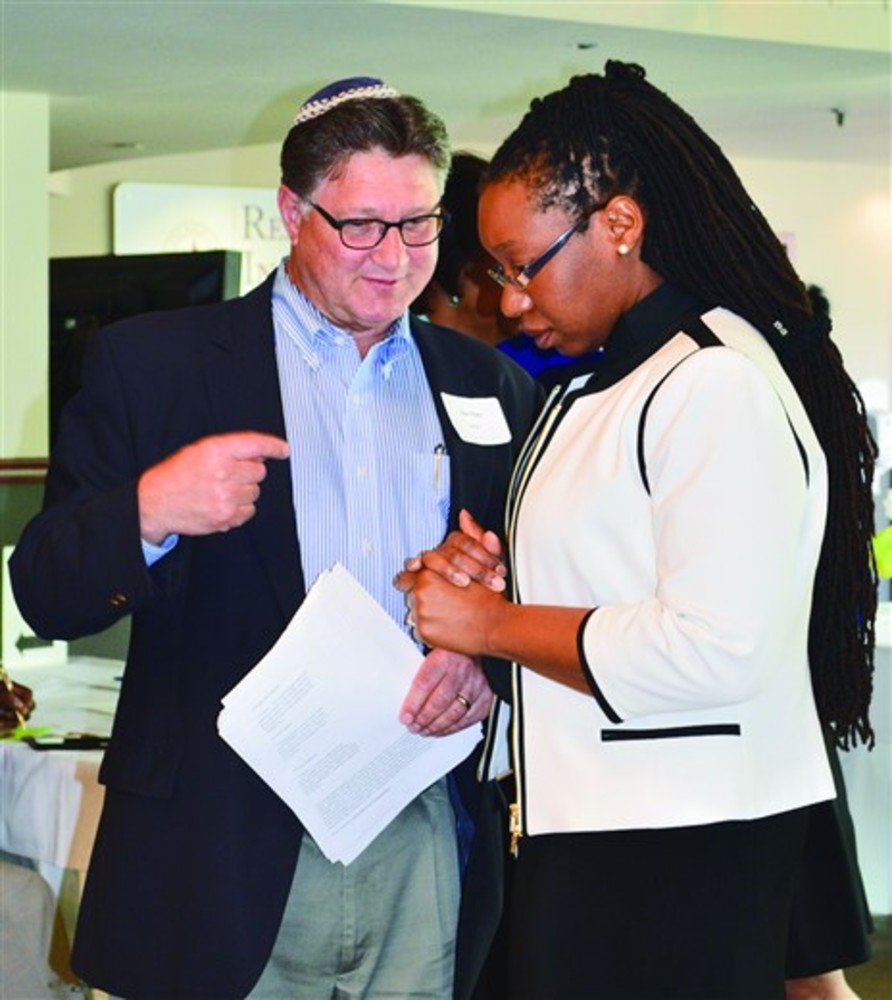Poverty conference speaker tackles economic growth for all
 Rabbi Alan Flam with Rev. Sekinah Hamlin. /PHOTOS | FRAN OSTENDORF
Rabbi Alan Flam with Rev. Sekinah Hamlin. /PHOTOS | FRAN OSTENDORF
PROVIDENCE – An improving economy typically doesn’t help everyone equally and a lot of well-intentioned efforts don’t pay dividends because the very people who most need help aren’t involved in shaping solutions.
“We can’t talk about growing an economy for all if ‘all’ aren’t at the table to talk about how the economy is disproportionately affecting them,” keynote speaker Rev. Sekinah Hamlin told about 125 people at the annual conference of the Rhode Island Interfaith Coalition to Reduce Poverty May 13 at Rhode Island College.
The conference has been inspiring local leaders for seven years. Taking a cue from the conference title, “Growing an Economy for All Rhode Islanders,” Hamlin suggested that it’s time to redefine the model for advocacy.
Hamlin is the director of the Ecumenical Poverty Initiative in Washington, D.C., a faith-based community group working to end poverty in the United States. The Disciples of Christ minister spoke with passion and energy about a cause that touches everyone in the room.
A Spoken Word video clip of a young man performing a powerful poem “Dead Man Walking,” opened the presentation. “In our realities, we often don’t hear the voices of the dead men walking,” she said. These are the invisible people, “Those who consider themselves trapped” in their communities.
Hamlin offered ideas and insights to get advocates and those living in poverty to work together toward the same goal – eradicating poverty and improving social justice. These are goals the conference attendees know well.
And she addressed where the issue of racism, “the elephant in the room,” fits into the picture. She said, “Racism has to do with whether your systems are open to me as a person of color.” Part of that system has to transform so everyone can be part of the conversation.
She said “it’s easy to talk about the gains we’ve made by those people of the colored communities who have the highest poverty rates here in Rhode Island… we are lobbying for people who are not a part of their empowerment.”
She suggested that as poverty advocates “we no longer expect those people to be at the table.” But it’s time to “make visible the invisible,” she said.
And she also suggested that those suffering in poverty don’t participate in formulating the solution “not because they don’t want to, but because they’ve been locked out.”
Her suggestions: to make visible the invisible, to get everyone working in the fight against poverty, to get everyone around the table. And she said that it’s important to get everyone talking and to empower those who are hurting to show their wounds in public. That effectively puts a face on the numbers, which is critical.
Respect and accountability are paramount. She cited a model from her home state of North Carolina where, “No matter where you are you are respected as a human being. Not only is there human dignity, but there is a place at the table for all.”
“Folks realize this is not an easy process,” she said. As progressives, Hamlin said, “We have to begin to have the hard conversations about people, hunger and hopelessness.”
“We have to build a true community. Not everyone looks the same. But there’s a place for everyone at the table.”
After Hamlin’s speech, conference participants chose from four workshops: Race, Poverty and Mass Incarceration; Heath Care and Health Insurance: Improving Care for Rhode Islanders; Interfaith Legislative Update/Next Steps; and Organizing Your Faith Community to Action. Before the keynote, the group heard the annual report on the state of poverty in Rhode Island from RI Kids Count and the Economic Progress Institute. Sen. Teresa Paiva Weed also spoke to the group about important legislation including efforts to increased the earned income tax credit.







